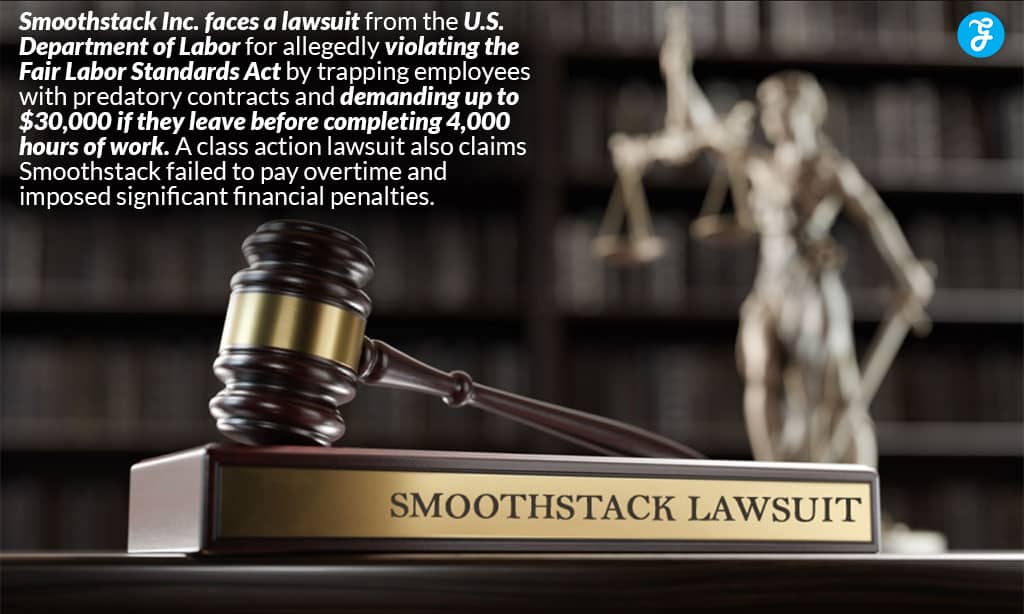Our blog will tell you about these problems and what they mean for workers and the tech field. We give clear facts without hard words or long sentences. Keep reading to learn more!
Overview of the Smoothstack Lawsuit
According to the Smoothstack lawsuit, the company forced employees to perform as though they were subject to antiquated unfair contracts. They also asked for $24K if an employee wanted to leave early.
Allegations of “modern-day indentured servitude”
Smoothstack faces charges of creating conditions like old-time forced work. They make employees sign contracts that are very tough. These contracts say workers must do 4,000 hours of paid work for clients.
If they leave early, they must pay nearly $30,000. This practice traps people in jobs they might want to leave. It is called “modern-day indentured servitude.”.
Many workers get paid for only 40 hours a week but work up to 80 hours. Also, only 8% of the people finish their training program as promised. This situation puts a lot of stress on employees who feel stuck because leaving means paying a big fee.
Charges of $24K to leave the company
Workers at Smoothstack face a big fee if they decide to leave before their contract ends. They must pay $24,000. This charge acts like a trap. It makes it hard for them to quit. The company says this covers training costs.
This practice raises questions about fairness and workers’ rights. It puts employees in a tough spot if they want to leave for any reason. This kind of setup can feel unfair to many people.
Key Allegations and Legal Claims


In the lawsuit, workers say Smoothstack broke labor laws. They claim the company made them sign unfair training payback deals.
Violations under the Fair Labor Standards Act (FLSA)
The lawsuit against Smoothstack says they broke rules about the least pay and extra time wages set by the Fair Labor Standards Act (FLSA). This meant some workers got less money than the law says is the minimum.
The company did not follow laws for paying more when people work over their regular hours. Now, those who worked for Smoothstack want to change their legal fight to focus on training repayment agreement provisions (TRAPs) under the FLSA too.
Workers say these practices made their earnings drop below what’s fair, according to federal rules. They are taking this issue to court to seek justice and make sure they get paid right for all their work time, including overtime.
This case has brought attention to how important it is for companies to follow labor laws that protect workers’ rights and ensure fair pay for everyone.
Enforced Training Repayment Agreement Provisions (TRAPs)
TRAPs are rules that make employees work 4,000 hours for clients or pay nearly $30,000 to leave their job. These rules mean workers must stay at the company for about two years of full-time work.
Justin O’Brien joined Smoothstack in 2020 and had to sign this type of agreement. He faced penalties if he didn’t agree.
After O’Brien spoke up about his worries, the company acted against him. This fight is now a big part of a lawsuit. The lawsuit says these TRAPs are not fair because they keep workers tied to their jobs for too long without fair choices.
Impact on Tech Workers and Industry
The Smoothstack lawsuit could make tech workers face tough job conditions and lower pay. It might also push the tech world to change how they treat their employees.
Financial and employment constraints on workers
Workers face big money problems because of these rules. They get paid for only 40 hours, even if they work up to 80 hours a week. This makes it hard for them to earn enough money. They are also told not to record any time over 40 hours.
Non-compete agreements stop workers from taking new jobs in the same field. This means they can’t leave for a better job or more pay. It traps them in their current job, even if it doesn’t pay well or treat them right.
Broader implications for the tech industry
The Smoothstack lawsuit shakes the whole tech world. It shows that unfair work stuff isn’t just happening at one place. Big names like Tata Consultancy Services and Cognizant Technology Solutions have faced similar cases.
This could push other companies to look at their rules and make sure they’re fair. If not, they might end up in court too.
This case also makes people talk more about how tech jobs link to student debt problems. Since it’s such a big deal, it could lead courts to set new rules on what’s okay and what’s not in working contracts across the industry.
Everyone is watching this case closely. It will guide future actions against bad labor practices in tech jobs, changing how things are done for better or worse.
Legal and Public Response


The U.S. Department of Labor took action against Smoothstack for alleged unfair labor practices. Media outlets and the public have shown strong interest in the case, shaping opinions on work rights.
Actions taken by the U.S. Department of Labor
The Department of Labor sued Smoothstack, Inc. and its COO, Boris Kuiper. They went to court in New York with the case Su v. Smoothstack, No. 1:24-cv-04789. This action shows they are serious about stopping bad work practices.
Their lawsuit says Smoothstack’s ways stop them from checking on worker rights well. They want Smoothstack to face money fines and pay workers for wages lost. This step could change how tech companies treat their employees.
Media coverage and public opinion
Media stories spread word about Smoothstack, calling it “modern-day indentured servitude.” Newspapers and TV shows tell how the company makes leaving costly. They share tales of $24K fines for quitting.
This news upset many people. They think it’s unfair to workers. Stories also show bigger problems in workplaces across different areas.
Public opinion grows strong against such practices. People talk online and in person about changing laws to help workers more. They support fights against non-compete agreements, like what FTC wants to do with Smoothstack contracts.
Many stand behind class action lawsuits seeking justice and better protections for employees everywhere.
Takeaways
The Smoothstack lawsuit shines a light on deep issues in workplaces. It shows us how some companies can trap workers in unfair deals. This case may change how tech jobs treat their people.
Now, the law is stepping in to help workers fight back. This could lead to better job conditions for many in the future.